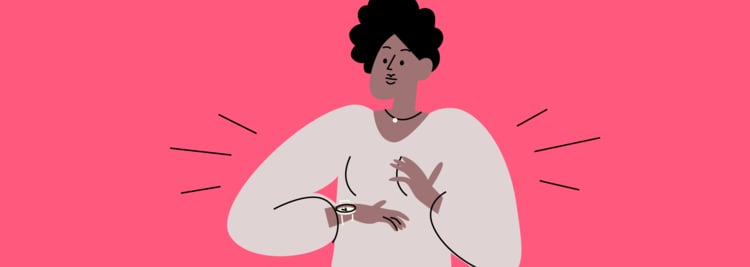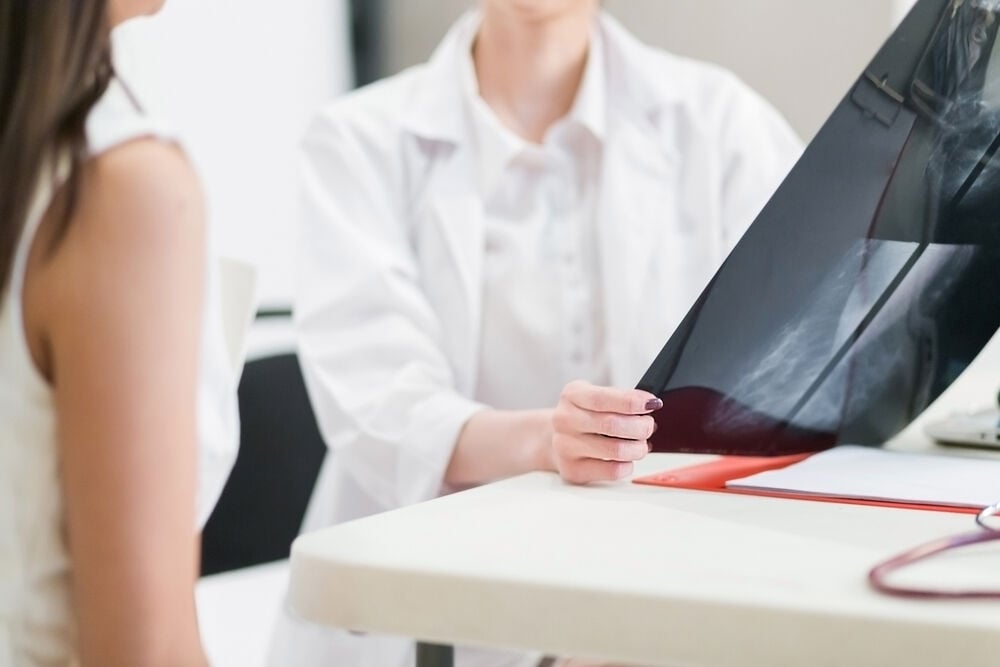It’s possible to have breast pain before, during, and after your period. Some people also have sore breasts during pregnancy. How can you determine what’s causing your breast pain? We’ve outlined some of the causes of breast pain and other symptoms before your period and during early pregnancy.
-
Tracking cycle
-
Getting pregnant
-
Pregnancy
-
Help Center
-
Flo for Partners
-
Anonymous Mode
-
Flo app reviews
-
Flo Premium New
-
Secret Chats New
-
Symptom Checker New
-
Your cycle
-
Health 360°
-
Getting pregnant
-
Pregnancy
-
Being a mom
-
LGBTQ+
-
Quizzes
-
Ovulation calculator
-
hCG calculator
-
Pregnancy test calculator
-
Menstrual cycle calculator
-
Period calculator
-
Implantation calculator
-
Pregnancy weeks to months calculator
-
Pregnancy due date calculator
-
IVF and FET due date calculator
-
Due date calculator by ultrasound
-
Medical Affairs
-
Science & Research
-
Pass It On Project New
-
Privacy Portal
-
Press Center
-
Flo Accuracy
-
Careers
-
Contact Us
Breast Pain: Period or Pregnancy? Symptoms and Possible Causes


Every piece of content at Flo Health adheres to the highest editorial standards for language, style, and medical accuracy. To learn what we do to deliver the best health and lifestyle insights to you, check out our content review principles.
Breast pain, also known as mastalgia, may be familiar. The pain can feel like tenderness, tightness, or a sharp burning pain.
The pain is generally categorized as cyclic or noncyclic. Cyclic breast pain is linked with your menstrual cycle, and it usually gets better after your period. This type of breast pain could be described as heavy, dull, or aching. It may be associated with swollen or lumpy breasts. It generally affects both breasts, particularly the outer and upper portions, and may radiate to your underarms.
Noncyclic breast pain isn’t related to your menstrual cycle. It may be intermittent or constant and is described as sore, burning, or tight. It generally affects a single breast and may be localized.
Breast pain before your period
Breast pain before your period may come with tenderness and swelling. This is a common symptom of premenstrual syndrome (PMS). In less common cases, extreme breast pain before your period along with tenderness and swelling may also indicate fibrocystic breast disease.
Most cases of sharp breast pain before your period are caused by fluctuating levels of hormones. The levels of hormones estrogen and progesterone change during your normal menstrual cycle. These hormones prepare your reproductive system and breasts for a potential pregnancy. Estrogen causes the breast ducts to enlarge. Progesterone causes the milk glands to swell. Your breasts may feel sore because of these changes.
Estrogen levels peak during the middle of your cycle, and progesterone levels rise during the week before your period.
The main signs and symptoms of breast pain before your period are heaviness and tenderness in both breasts. Some people experience dull aching in their breasts. The breast tissue may feel coarse or dense to the touch. Symptoms may appear a week before your period and disappear gradually after. Most people don’t experience severe breast pain before their period.
Breast pain before your period may improve as you approach menopause because of the natural changes in hormone levels that occur as you age.
Take a quiz
Find out what you can do with our Health Assistant
In some cases doctors suggest treating breast pain with over-the-counter nonsteroidal anti-inflammatory drugs. These medicines may also help relieve menstrual cramps.
People with moderate to severe breast pain before their period should visit their health care provider, who can recommend the best possible treatment. Diuretics may reduce water retention, swelling, and tenderness. Use these medicines only under the direction of your health care provider.
Some people have reported that they experience less breast pain while taking oral contraception. However, breast pain by itself is usually not treated with oral contraception. Sometimes oral contraceptive pills actually make the symptoms worse. Talk to your health care provider about any symptoms you’re experiencing. If you want to start taking oral contraception, they can help you find the best one for you.
You may also manage breast pain and other period symptoms by making certain lifestyle changes. You can wear a sports bra to support your breasts. You can also wear a bra at night to provide extra support while you’re sleeping.
Diet can play a vital role in the symptoms you experience before your period. Alcohol, caffeine, and foods with high amounts of salt and fat can increase premenstrual discomfort in breasts. Eliminating or reducing these foods and beverages from your diet the week before your period may help manage or prevent some unpleasant premenstrual symptoms. Eat a low-fat, high-fiber diet that contains a lot of whole grains and vegetables.
Certain vitamins may also help relieve breast pain and other premenstrual symptoms. Check with your health care provider before taking any vitamins or supplements to make sure they’re safe for you.
You can also include a variety of nutrient-rich foods in your diet. Some of these include corn, olive, canola, and safflower oils, peanuts, spinach, hazelnuts, carrots, oat bran, bananas, brown rice, and avocados.
Breast pain a week before your period: should you be worried?
Your levels of progesterone peak during the week before your period. Progesterone causes your milk glands to swell, resulting in breast pain and tenderness. Experiencing premenstrual breast pain a week before your period is completely normal and nothing to worry about.
Breast pain two weeks before your period: what does it indicate?
Breast pain two weeks before your period can occur because of hormone fluctuations, which happen around the middle of your menstrual cycle or when you are ovulating. This can result in breast pain two weeks before your period along with a feeling of heaviness in your breasts.
Breast pain during your period
Breast pain that starts a week or two before your period may continue through your period and taper off gradually after your period is over.

Breast pain after your period
If you have breast pain after your period, then it may not be related to your period. Instead, it may be noncyclic pain caused by something else. It may affect one or both breasts. Some possible explanations for breast pain after your period include pregnancy, trauma to the breast, a poorly fitting bra, mastitis, and fibrocystic breast changes. Costochondritis and back, shoulder, or neck sprains may also feel like breast pain. Taking certain medication such as antidepressants and oral contraceptives can also cause breast pain after your period. Having surgery on your breast and the resulting formation of scar tissue can also result in breast pain.
Most breast cancers don’t cause pain. But if you experience breast pain after your period that doesn’t get better, you should consult your health care provider immediately, particularly if you have any of the following signs and symptoms.
- A lump in your breast
- Any clear or bloody discharge from your nipple
- Symptoms of a breast infection including pus, fever, redness, or tenderness
- Pain or lump in your breast without any cause or that doesn’t get better
Period breast pain vs. pregnancy breast pain: what’s the difference?
For many people, breast changes are among the earliest signs of pregnancy. Pregnancy influences the levels of estrogen and progesterone in your body. Estrogen enhances the growth of breast ducts, and progesterone supports the growth and formation of milk-producing tissue. Your breasts may feel swollen, sensitive, tender, or sore during early pregnancy because of these hormonal changes. Your breasts may also feel heavier and fuller. These changes usually occur one to two weeks after conception and may last until your progesterone levels settle.
Symptoms of PMS, such as breast pain, tenderness, and swelling, can happen during the second half of the menstrual cycle. The symptoms tend to be most severe just before your period starts. Your breasts may feel dense and bumpy, particularly in the outer region. Breast pain caused by your period may feel like a dull pain with a sense of heaviness and fullness. The pain usually gradually improves after your period.
Breast pain can appear a week before your period starts and gradually taper off afterwards. You can take over-the-counter nonsteroidal anti-inflammatory drugs to relieve the breast pain. You can also make certain lifestyle changes to improve the pain. Breast pain after your period that doesn’t get better may have no relation to your menstrual cycle. If you have breast pain unrelated to your menstrual cycle that doesn’t get better and there is an accompanying lump, nipple discharge, or signs of a breast infection, then immediately consult your health care provider.


Hey, I'm Anique
I started using Flo app to track my period and ovulation because we wanted to have a baby.


The Flo app helped me learn about my body and spot ovulation signs during our conception journey.


I vividly
remember the day
that we switched
Flo into
Pregnancy Mode — it was
such a special
moment.
Real stories, real results
Learn how the Flo app became an amazing cheerleader for us on our conception journey.
References
Mayo Clinic Staff. “Breast Pain.” Mayo Clinic, Mayo Foundation for Medical Education and Research, 31 Jan. 2019, www.mayoclinic.org/diseases-conditions/breast-pain/symptoms-causes/syc-20350423.
“Breast Pain.” NHS Choices, NHS, 28 June 2017, www.nhs.uk/conditions/breast-pain/.
Editorial staff. “Breast Pain in Women - Breast Pain Causes.” Familydoctor.org, 18 Dec. 2019, familydoctor.org/condition/breast-pain-in-women/?adfree=true.
Mancini, Mary. “Breast Pain: MedlinePlus Medical Encyclopedia.” MedlinePlus, U.S. National Library of Medicine, 30 Oct. 2018, medlineplus.gov/ency/article/003152.htm.
“Mastalgia Fact Sheet: Westmead BCI.” Westmead Breast Cancer Institute, Apr. 2018, www.bci.org.au/breast-cancer-information/fact-sheets/mastalgia/.
Cleveland Clinic medical professional. “Breast Pain (Mastalgia) Management and Treatment.” Cleveland Clinic, 29 May 2014, my.clevelandclinic.org/health/diseases/15469-breast-pain-mastalgia/management-and-treatment.
Kataria, Kamal, et al. “A Systematic Review of Current Understanding and Management of Mastalgia.” The Indian Journal of Surgery, Springer India, June 2014, www.ncbi.nlm.nih.gov/pmc/articles/PMC4141056/.




